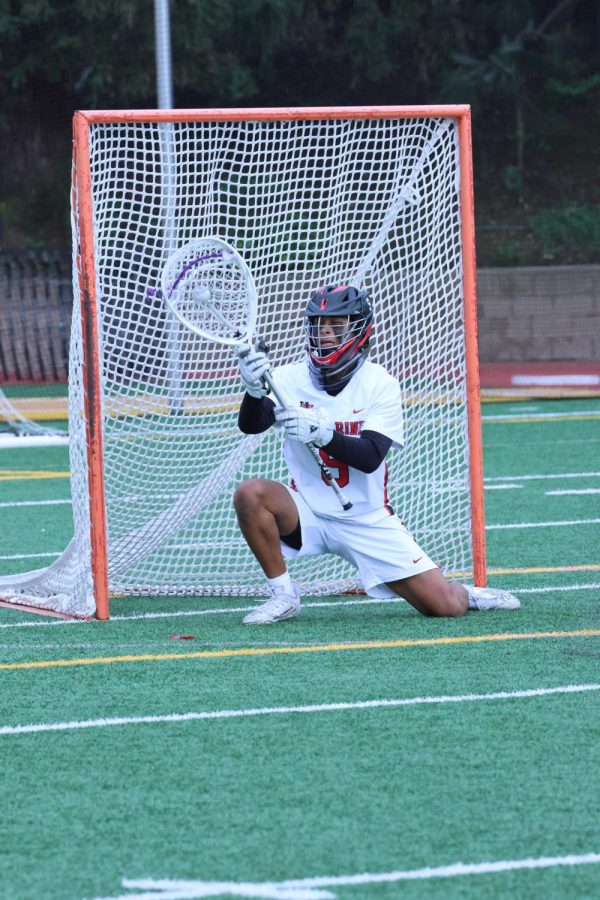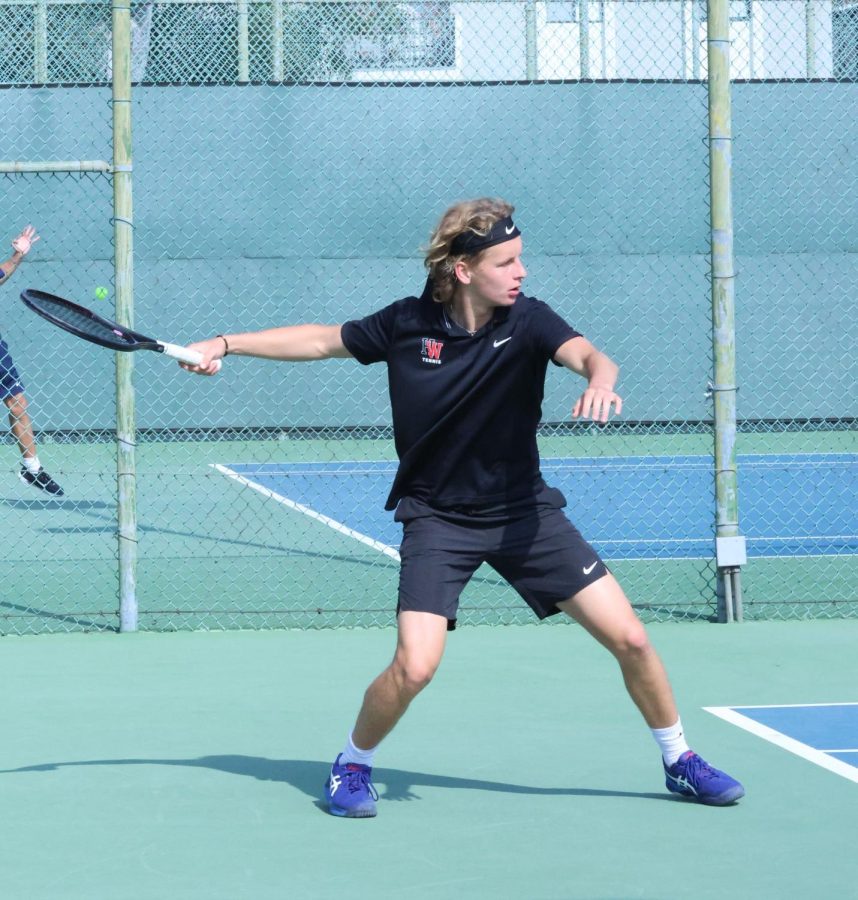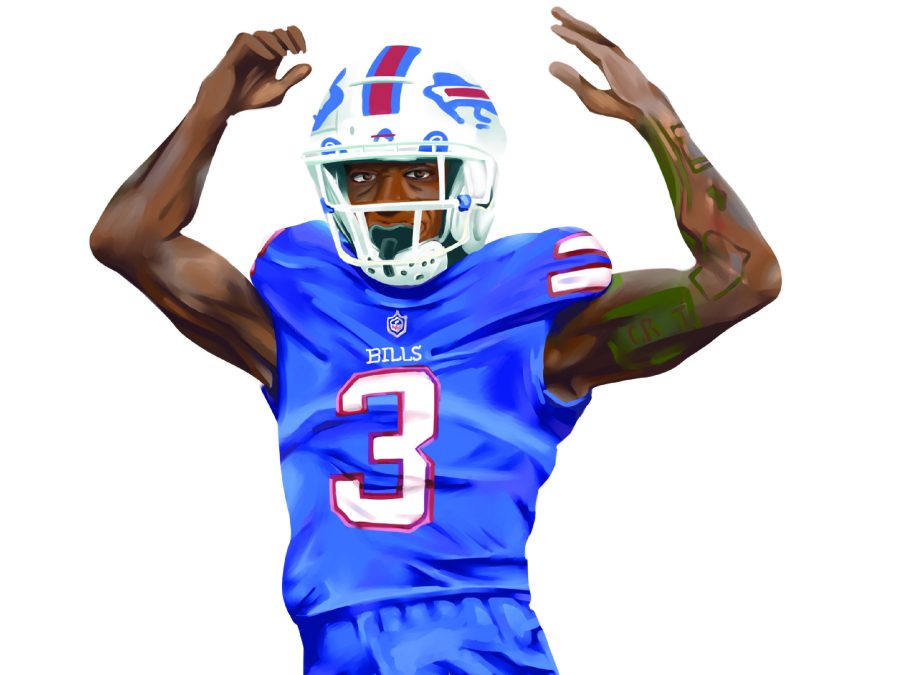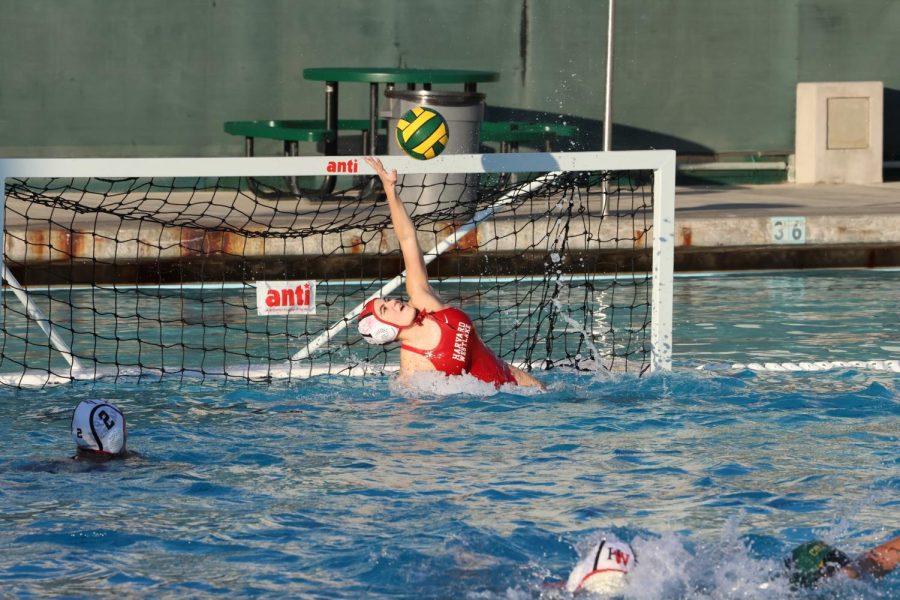What does the title of Head of Athletics entail?
Succinctly, I am responsible for the athletic programs from 7th through twelfth grade. That includes the coaches. That includes staff. That includes the kids when they’re playing sports. I am the division head for the Athletic Department at Harvard-Westlake grades seven through 12. What that looks like is that I try to stay out of the way of the professionals with whom I work that really know what they’re doing and are good at it, such as the coaches and athletic directors. And I spend a good amount of my time interacting with people outside the athletic department, so whether that’s teachers, administrators, CIF or other schools, I spend a good portion of my time doing that, and the day-to-day functioning of the department is really done by the coaches and by the athletic director.
How long have you had the Head of Athletics title?
This is my fifth school year doing this and before that I was an athletic director for eight.
In the last five years, are there any moments that stand above the rest as your favorite?
That’s hard. I think there are a couple that stand out to me. Winning the National Championship in baseball in 2013 was pretty cool. Being at Dodger Stadium and winning the championship was a neat thing. This year, having both our boys’ and girls’ basketball programs, and particularly our girls’ basketball program, who was playing in the Open Division championship game down at the Honda Center against Long Beach Poly. A team of nine girls doing that, that’s pretty special, and the fact that our girls’ basketball team made back-to-back Open Division runs, for a school of our size, in a sport like girls’ basketball, to do that is pretty remarkable—that doesn’t happen very often. Watching my son run and become a CIF champion and make it to the State finals in the 200 meters—that’s a special thing. That’s more of a dad thing, but the fact that I work here as well, made it special.
The growth of ISSSM [Institute for Scholastic Sports Medicine] and how that has really become a real bridge between the academic and athletic parts of our school has been special. So having David Hinden oversee that, and the facility being the construction here underneath Taper, has been great, and how the locker rooms look now is a sense of pride that our athletes have that they haven’t had in the past. One of the first things I did as Head of Athletics was that I was part of the ceremony to open Copses Family Pool in what was literally my first year. Really getting a chance to look at almost a million gallons of water in a fifty meter pool on a high school campus, that was sweet.
Boys’ water polo going undefeated in 2014 and winning a national title was pretty cool too. We rolled people. I don’t know that there has been a team in Harvard-Westlake history that’s been as dominant as that water polo team. We just crushed people, and that was pretty special to be a part of and watch. Those were some of the highlights that when I think back on them, I think ‘This is pretty special.’
Do you think having a son (Alex ’16) that was an athlete at Harvard-Westlake helped you in your job?
There is no question that being a parent has helped me be a better administrator, because I understand more clearly what the kids are going through, since I’ve seen that kid come home for the six years he was at Harvard-Westlake. He did sports at every different level we have here, and I saw what was important to him, and it’s the reason why I have that football trophy over there. That’s a trophy that I won in eighth grade and I keep it there as a reminder that, because when I won that trophy, that was the biggest trophy I had ever won. It was an MVP of an all-star football game, of eighth graders, essentially, and it kinda looks like the Heisman and I was like ‘Wow! That’s the greatest thing that i’ll ever do!” fortunately it wasn’t the greatest thing that I ever did, but at the time I remember how important that was to me, and how that trophy seemed to be 10 feet tall. That’s why that little jersey is up there, that’s the first little jersey I ever had, I had that little jersey when i was like five years old. It reminds me, that at every level, that’s the highest level those kids have ever competed at. It is their varsity for their life, at that point. And that’s an important perspective to have. So while we can get caught up in “aww, it’s just middle school” or “aww, it’s just JV,” for the kids on that team, that’s it, that is the most important thing. And for their families, it’s the most important thing, and so it kinda keeps me grounded in that way, I understand the challenges that families have, when your kid doesn’t have a good performance and you’re feeling bad and you’re not quite sure how to console him or her. And you have your own issues needing to be consoled because you’re disappointed, as a parent, I get it, I get it, and I think I have a level of empathy that I would not have had, had I not had a son go through here.”
What is your favorite aspect of your job?
“The games. The fact that, and I don’t get to do it often unfortunately, because I have a lot of meeting in the afternoons, on any given day at 3:00 p.m.,my job duties include some kind of watching high school kids play sports. And that’s actually my job — I’m getting paid to go and watch the football game, or the baseball game, or the tennis match, or the track meet, that’s awesome.
What’s the furthest you’ve ever had to travel for a Harvard-Westlake game?
I have to say it would be this year, when I went with girls’ basketball to watch their games in D.C.—it was an outstanding trip, and it’s the quintessential Harvard-Westlake trip. It’s high level basketball on a national stage, combined with a trip to Nancy Pelosi’s office, visiting the monuments, and getting a behind the scenes tour of the National African American Museum. It’s quintessential Harvard-Westlake, the marriage of sports and academics at a high level, and it was all encompassed in the Washington, D.C. trip.
Who’s the final four in your bracket?
I didn’t fill out a bracket this year. I’m so competitive, and I get so angry when I bomb every single year that I can’t put myself through it. And, here’s the other reason: I’m a die-hard Trojan. I can’t bring myself to fill out a bracket that at some point has USC losing. From a logical standpoint, of course, they’re an 11th seed and they’re not winning the national championship in basketball. But when I have to go down on a piece of paper and choose between Baylor and USC, I can’t bring myself to say, “Baylor’s going to beat USC,” I end up busting my own bracket with my own loyalty and emotional attachment to teams. And I know Georgetown didn’t make the tournament this year, but when they have made it in the past, I always root for Georgetown. So I’d have Georgetown going further than other teams. I’m too emotional with sports. I have too much loyalty and allegiances, so I can’t be open minded about it, and I end up having a horrible bracket every year, so I saved myself the agony this year.
Was it still a satisfying tournament run for USC, in the end?
Yeah, it was fine. I wish we would’ve beat Baylor. To be able to say we made it to the Sweet 16 would’ve been awesome but it was as far as we were going to go
Is there a policy on explicit music in locker rooms?
Our stance, the school’s stance, is that all music that is played on campus needs to be clean and not contain offensive language. We have an interesting challenge this year in that again, the remodeled locker rooms, part of what we wanted was that we wanted a place where athletes felt like students, and where they felt like they could hang out and be with one another. And we didn’t have that in the past. We don’t have a student lounge, or student athlete lounge or anything like that; we ask our athletes to spend a lot of hours doing what they do, so to have somewhere comfortable where they can relax and hang out and have fun, we wanted that. One of the unintended byproducts is that, when you put a group of teenagers together, they’re gonna do what teenagers do, and that’s play music, and laugh and joke, and what we’ve found is that occasionally that music is not appropriate. And so we have done a better job recently of policing that, making sure that that message is out to the coaches and to the teams, that all music that’s played should not contain graphic language or offensive lyrics and that we should be respectful of everyone in our community.
When was this first brought to your attention? Was it the girls soccer team?
Girls’ soccer was when it was first brought up that it was an issue and that there was music that was being played that was offending members of our community. That’s when we first heard about it.
What was the reaction to it? What have you guys done to address this?
Initially, we stopped playing the music because I wanted to hear a little bit more context on exactly what happened, and how all of it transpired. So I was able to talk to some members of the team, and BLACC was involved, and they were able to have some conversations with members of the team as well, and essentially there was no ill intent, but there were inappropriate lyrics that were offensive to some people. So where we’ve gone to now is that we have made it clearer that the music needs to be clean, and those lyrics that have words that should not be used on our campus need to be removed from the song. And I think that’s where we are now, and we’re moving forward in a positive direction.
What happens if that isn’t the case, especially since there is foul language in music?
It gets shut down immediately. And from time to time that will happen, where there will be someone or maybe a small group of people in the corner of the room playing music, and it doesn’t have clean lyrics, and when an adult hears that, they turn it off, and that’s how we’ve been handling it.
What role do you think the athletic department plays in terms of diversity, because in many ways the ath dep is the most diverse pocket of campus, whether that be racially, socioeconomically, and in some cases politically?
I think that because in many ways we are the face of the institution for people external to Harvard-Westlake, more often than not their first contact with our school is via sports. They either come on campus to watch their school compete or we go to their school to compete, or we’re competing somewhere at a neutral site. But seeing our athletic teams and seeing our coaches is often a person’s first interaction they have with Harvard-Westlake, to the point that making sure our teams are an accurate reflection of who we are as a school is important. So, I think that the role athletics plays is that we are the face of the school frequently, and we are the first contact, thus we want that contact to be a positive point. One of the things that we have been focused on, and will continue to be focused on, is having adult female role models for our students. We try to do that, because we want our young girls to know that teaching and coaching is a worthwhile profession that they should consider as a career option, and they can only see that if they see examples of it, and if they have role models where they say “Wow, that coach really had an impact on my life, and that coach happened to be female.” So, that’s something we have really been putting a priority on.
[Being an LBGT athlete has] always been, in American society, a very interesting place of intersection, because athletics just seems such a very hypercharged society or atmosphere. I think I’ll start with the obvious: what legacy does [Jason Collins] leave here and how does that change things?
I think Jason Collins ’97, not only for his basketball play, but for the role that he’s played in American society and American culture, really has been a significant benefit to our school and to our athletic department. Because his athletic ability is unquestioned, and that can be proven by the championships his teams have won and the success he’s had, not only at the high school level but the collegiate level and the professional level, he’s unquestionably one of the best athletes in the history of our school. But for him also to be a gay athlete really breaks down the misconceptions that people have that you can’t be one if you are the other. We now have that shining example to point to, and I think that he has provided hope, encouragement and support to members of the LGBT community who are athletes and aspire to be athletes at a high level. He shows that who you are does not limit what you can be. And we’re so proud of him for that, and even more proud that he remains an active member of our community, coming back to basketball games, talking to kids, talking to coaches. He and his brother hold a summer camp here every summer for youth, not only within our community but the external community as well. He is just a real beacon of light for our athletics department.
To your knowledge, have there been more openly gay student-athletes at Harvard-Westlake?
Yes, we have had openly gay student-athletes at Harvard-Westlake in my time here. I think that more and more athletes and students are feeling more comfortable coming out as gay and being athletes, and I think that’s a great thing. I love when they feel comfortable, when they feel embraced by their team and embraced by the community, so I think that’s real positive. I like that we are a leader in that area, I think that that’s very important for our community and for society at large.
Have you sensed a shift in the Athletic department in this regard in the 13 years that you’ve been here?
Absolutely. I can remember when I first got here, coaches weren’t really talking about gay and lesbian athletes at all. And then there was a period of time where it was okay to say, “I probably do have gay and lesbian students on my team, how do I coach them, what do I do?” And then what we have evolved to now is the knowledge that “you coach them,” and there isn’t some special thing you need to do because you have a gay or lesbian student on your team. Instead, coaches treat them as they would any other student. What we have to be aware of is our natural bias, where we may say things out of assumption when we’re addressing a group of boys and say “Hey, you know, don’t bring your girlfriend problems here,” or if you’re addressing a group of girls, “Make sure you don’t bring you boyfriend problems here.” That’s language that makes assumptions that are not fair, so making sure that how we teach our kids is inclusive of everyone, regardless of what background they come from, means that our word usage is important and the examples that we use are important. I think our coaches are much more versed in that now, and don’t unintentionally offend to the extent that they would’ve a dozen years ago.
And lastly, politically speaking, as you get a nation that has seen more and more of a stark divide, and again, you see that in athletics there is another extreme cross section with politics, as we saw that with Colin Kaepernick and the national anthem discussion that happened earlier this year. Has that played out at all, or are there any observations you’ve made about political thought in the athletic department because I think it is safe to say that there is probably a higher concentration of conservative students who are athletes here than with the entire school as a whole?
I don’t know. I wouldn’t venture a guess on whether athletes tend to be more conservative or liberal from a political standpoint. I will say this: as a group, we [coaches and staff] had this discussion in the fall about the national anthem, what would be our response, And what would be each individual coach’s response if a student on their team decided not to stand for the national anthem. And it was a great discussion, and it was a great debate, people voiced opinions on both sides of the argument and so it was really healthy. What we got to is two things: one, coaches should have a conversation with their teams ahead of time about their own expectations as it pertains to behavior and the national anthem. Make sure there is a clear understanding and dialogue at that point. That being said, standing or not standing for the national anthem is an individual choice, and as a school we honor and protect students’ rights to make that choice, so we would not punish a student were he or she to choose not to stand for the national anthem. While there may be members of our community who don’t like it and would prefer something for them to demonstrate or to express themselves in some other manner, that’s a right that they have, not to stand, and we as a school would not punish someone for exercising that right.
What does diversity mean to you, personally, and how do you bring that to the position that you hold.
I think diversity to me means surrounding yourself with as many different ways of thinking as you possibly can. Yes, I think obviously ethnic and cultural diversity is important, and religious diversity is important, but more important, I believe intellectual diversity is important. Getting people together who think differently, that’s when the most powerful change is possible. When people come from different backgrounds, have different perspectives on the same issue and they’re able to collaborate to come up with one unified answer, that’s when we’ve taken the step forward. So to me, diversity is as much an intellectual endeavour as it is a racial or religious or cultural endeavour. It’s bringing together people who think differently about the same topic and teaching them how to work collaboratively to come up with a result that is better than it could’ve been in their own individual silos of thought.





























